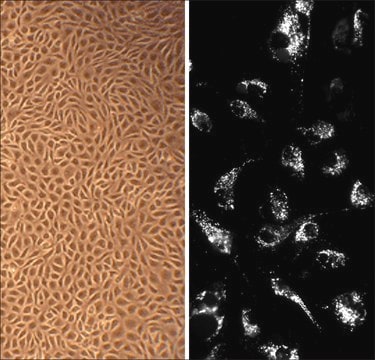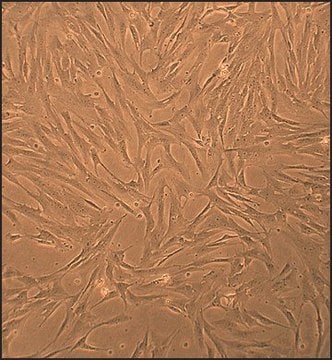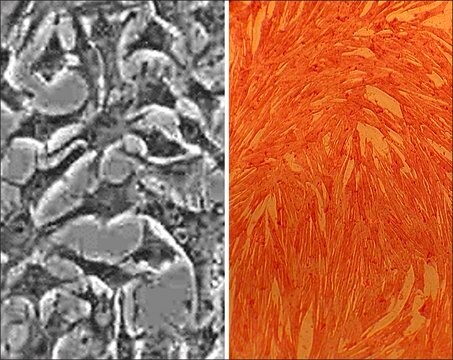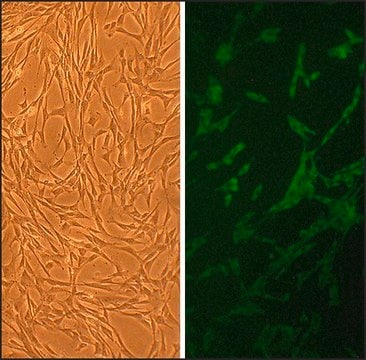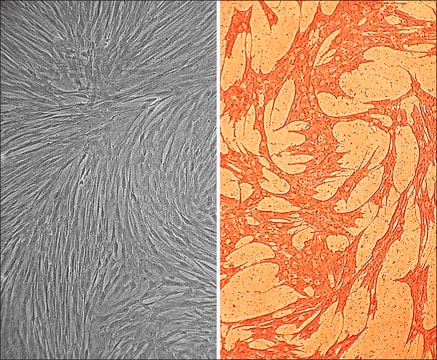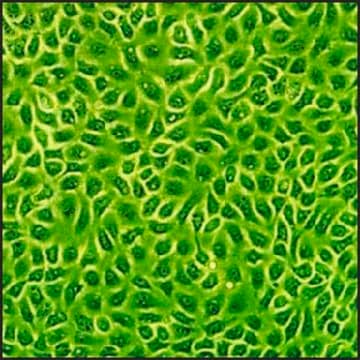P300-05
Porcine Coronary Artery Endothelial: PCAEC (Cryovial)
Sign Into View Organizational & Contract Pricing
All Photos(2)
About This Item
UNSPSC Code:
41106514
NACRES:
NA.81
Recommended Products
biological source
Porcine coronary artery
Quality Level
form
solid
packaging
pkg of 500,000 cells
manufacturer/tradename
Cell Applications, Inc
growth mode
Adherent
karyotype
2n = 38
morphology
Endothelial
technique(s)
cell culture | mammalian: suitable
relevant disease(s)
cardiovascular diseases
shipped in
dry ice
storage temp.
−196°C
Related Categories
General description
Lot specific orders are not able to be placed through the web. Contact your local sales rep for more details.
Arterial endothelial cells play critical roles in cardiac homeostasis, and insults to the endothelial cells have been linked to a variety of vascular diseases. Porcine artery endothelial cells provide a useful tool to study artery endothelial function and metabolism.PCAEC from Cell Applications, Inc. have been used to investigate a new mechanism of obesity-associated vascular disease by demonstrating that resistin, an adipocyte-derived cytokine implemented in insulin resistance and diabetes, can cause endothelial dysfunction in coronary arteries through oxidative stress and down-regulation of NO synthase (Kougias, 2005). Conversely, secretoneurin was shown to activate expression of NO synthase and calmodulin, leading to endothelial relaxation (Chan, 2011). PCAEC were also used in adhesion and transmigration experiments in a study investigating anti-inflammatory, cardioprotective effects of a novel adenosine-lidocaine drug formulation (Shi, 2012).
Arterial endothelial cells play critical roles in cardiac homeostasis, and insults to the endothelial cells have been linked to a variety of vascular diseases. Porcine artery endothelial cells provide a useful tool to study artery endothelial function and metabolism.PCAEC from Cell Applications, Inc. have been used to investigate a new mechanism of obesity-associated vascular disease by demonstrating that resistin, an adipocyte-derived cytokine implemented in insulin resistance and diabetes, can cause endothelial dysfunction in coronary arteries through oxidative stress and down-regulation of NO synthase (Kougias, 2005). Conversely, secretoneurin was shown to activate expression of NO synthase and calmodulin, leading to endothelial relaxation (Chan, 2011). PCAEC were also used in adhesion and transmigration experiments in a study investigating anti-inflammatory, cardioprotective effects of a novel adenosine-lidocaine drug formulation (Shi, 2012).
Cell Line Origin
Artery
Application
cardiovascular function, angiogenesis, vascular biology, regulation of coronary blood flow, cardiac functions, effects of vaso-dilators, coagulation, fibrinolysis, vessel wall tone, cytokine production
Components
Porcine Endothelial Cell Growth Medium that contains 10% FBS and 10% DMSO
Preparation Note
- 2nd passage, >500,000 cells in Porcine Endothelial Cell Growth Medium that contains 10% FBS and 10% DMSO
- Can be cultured at least 12 doublings
Subculture Routine
Please refer to the PCAEC Culture Protocol.
Storage Class Code
11 - Combustible Solids
WGK
WGK 3
Flash Point(F)
Not applicable
Flash Point(C)
Not applicable
Certificates of Analysis (COA)
Search for Certificates of Analysis (COA) by entering the products Lot/Batch Number. Lot and Batch Numbers can be found on a product’s label following the words ‘Lot’ or ‘Batch’.
Already Own This Product?
Find documentation for the products that you have recently purchased in the Document Library.
Our team of scientists has experience in all areas of research including Life Science, Material Science, Chemical Synthesis, Chromatography, Analytical and many others.
Contact Technical Service